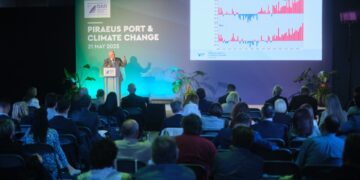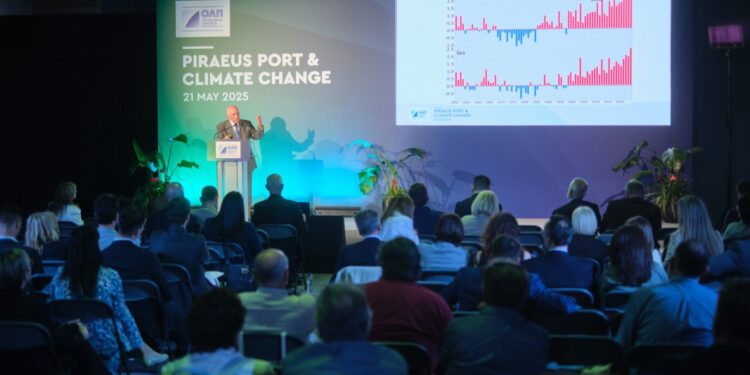The Port of Piraeus: Tackling Climate Change Challenges
The Piraeus Port Authority (PPA) S.A. has developed a comprehensive study focused on enhancing the resilience of Piraeus port infrastructure for sustainable operations in the future. This initiative was undertaken in collaboration with the Academy of Athens and consulting firm Adens S.A., bringing together leading academic and environmental organizations.
Professor Christos Zerefos, Secretary General of the Academy of Athens, emphasized that “cooperation among public, private, and academic sectors is crucial for achieving effective and lasting change” while presenting this important study at the PPA’s stone warehouse.
A Call to Action
Professor Zerefos raised urgent alarms regarding the alarming rise in global temperatures and carbon dioxide levels. He warned that without swift action to embrace alternative energy sources, global temperatures may rise by 4-5 degrees Celsius compared to the last 50 years’ averages. Such an increase could have dire consequences for nations like Greece, which is already grappling with water scarcity.
He underscored the necessity of adhering to the Paris Agreement’s goals, which aim for an 80% reduction in fossil fuel dependence, transitioning instead to renewable energy sources. He noted a recent European Commission study indicating that the EU could achieve 80% energy independence thanks to renewable resources, with France leading and Greece following closely.
A Sensitive Location
Zerefos highlighted that the Port of Piraeus is situated in a particularly vulnerable geographic area, where the sea breeze serves as both a cooling element and a vector for pollutants, carrying ship emissions into the urban atmosphere.
Proposed Adaptation Measures
Environmental civil engineer Stella Kaimaki from Adens S.E. addressed the system’s vulnerability to climate change, outlining essential measures for Piraeus Port. These include:
- Enhancing resilience and adaptive capacity of operations
- Implementing real-time monitoring systems
- Relocating vulnerable equipment from high-risk zones
- Investing in backup solutions for crucial assets (e.g., electricity, water)
- Upgrading PPA S.A. buildings with bioclimatic features
- Utilizing smart and passive cooling techniques
- Installing early warning systems
- Revising regulations and standards to align with new conditions
- Zoning operations and limiting new infrastructure in risk-prone areas
Transitioning Towards a Sustainable Future
A GIS-based database of infrastructures and the development of energy management systems are planned, allowing for optimized consumption and prioritization of essential functions during extreme conditions, like heat waves. The findings of the Piraeus Port study demonstrate that adapting to climate change is now an imperative, not merely an option.
With robust scientific backing and interdisciplinary collaboration, Greece’s largest port is striving to maintain its resilience and sustainability in the evolving environmental landscape.
Message from Minister Kikilias
During the event, Vasilis Kikilias, Minister of Maritime Affairs and Insular Policy, highlighted the repercussions of the climate crisis and the necessity for a strong preventive framework to address contemporary challenges. He emphasized prioritizing the safety of citizens and critical infrastructures like ports, advocating for a framework that transforms the seemingly impossible into achievable objectives.
“Our aim is to support all initiatives of Piraeus Port to continue contributing value to society,” the minister stated, further asserting that Piraeus Port adds considerable value to the surrounding municipalities and must keep investing in infrastructure.
Adapting to Rapid Changes
Su Xudong, CEO of PPA S.A., referred to the study as a partnership between science, governance, and sustainable development, stressing that Piraeus, as a key hub for Greece and Europe, must lead the way toward a sustainable future. He noted that rapid changes in technology and the climate crisis cannot allow ports to remain passive; they must act with vision and purpose.
He reiterated that sustainability should be seen as a strategic direction offering development opportunities with responsibility and social consciousness. PPA has already initiated efforts to adapt the port to climate change impacts with collaboration from esteemed academic institutions. Su Xudong reaffirmed PPA’s commitment to aligning with national policies and prioritizing support from the state while considering the unique needs of major ports in future regulatory frameworks.

















